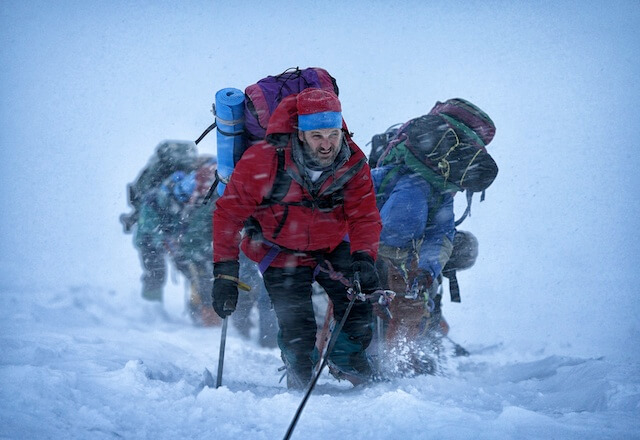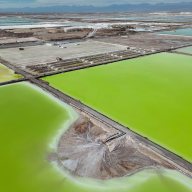‘Everest’ “Everest” was filmed on location with 3-D IMAX cameras, though you might not always know it. Most mountaineering films — such as the IMAX doc also called “Everest” — privilege the mountains over the people scaling them. Here the token gasp-inducing shots of vistas are few and far between, and it’s so unclear what’s real and what’s a sound stage that what might be the actual Everest can sometimes look fake. Not that that’s a bad thing. The focus is less on the awe than on the shock, with super-sized images used to get close to people as they cling to life, fighting off a cocktail of freezing temperatures, looming dementia and a Murphy’s Law storm of coincidences, all of which resulted in the 1996 catastrophe that claimed a dozen lives. It’s an intimate real-life disaster movie. The joke, if you will, in “Everest” is that by 1996 it had been conquered enough that it was no longer a bugaboo. The teams that head to the summit are a mix of seasoned pros and moneyed amateurs, forking over fortunes to earn both killer views and, most important, bragging rights. The first half doesn’t even OD on doom. It’s a rollicking adventure with some mild trudging chased with boozing with the Russian climbers, who swear through vodka breath that they’ll never turn to oxygen tanks. Few in the ensemble cast get personalities, though Josh Brolin’s good ole boy doctor Beck Weathers — rolling into the club in a Bob Dole shirt and quick to boast of his “100 percent Texan” bona fides — has enough spirit to fill three IMAX screens. RELATED: The makers of the doc “Meru” explain how to film a mountain while climbing it The good times make the stuff-hits-the-fan turn all the more galling. Having reached the summit and literally touched the peak — a moment of triumph rendered as comedic anticlimax — getting down proves to be the problem. A storm sweeps in before certain climbers have turned back. What follows is a brutal waiting game. Among those stranded in inhospitable climes is Jason Clarke’s Rob Hall, the rugged group leader who finds himself curled up in a nook, patiently, almost inhumanly biding his time as numerous attempts to save him come and pass. Go in with little knowledge of the body count and “Everest” plays like an “Apollo 13,” only one where there’s a slim chance the ones in trouble will make it. Technically, dramatically, there’s not much here. Once everyone’s stuck, with little hope of rescue, it becomes a battering ram of grace-through-suffering — alternately “The Passion of the Clarke” and “The Passion of the Brolin.” But this is by design. Icelandic director Baltamar Kormakur (“101 Reykjavik,” “Two Guns”) focuses on the existential loneliness of being trapped by cruel and dispassionate nature. Most of the images are of dimly lit people shivering while surrounded by black nothingness at night or, by day, staring snowblind into pure white. That we don’t really know anyone, apart from a basic trait (if that), isn’t a problem; the film, like the elements, is reducing them to mere bodies. The fates don’t care if the potential victims are newbies, like John Hawkes’ mailman/carpenter, or vets, like Hall or Jake Gyllenhaal’s hot shot Scott Fischer, who arrives with a grumpy reporter in tow — a frat boy out to repeat on old thrill. The closest the film comes to savage commentary is when one survivor survives only because he or she has gobs of money — the only thing that will stop short of literally moving mountains. Otherwise this expensive production has true modesty, holding back on sentiment and even Instagrammable sights to treat its subject with respect and terror.
Director: Baltasar Kormakur
Stars: Jason Clarke, Josh Brolin
Rating: PG-13
3 (out of 5) Globes
‘Everest’ favors chilling intimacy over Instagrammable sights

Jason Boland
Follow Matt Prigge on Twitter @mattprigge















